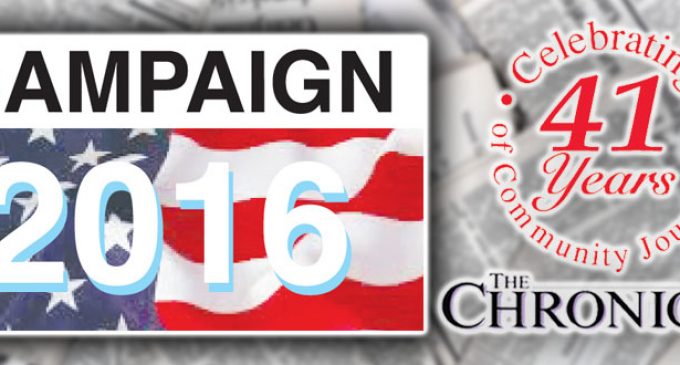Why many believe whoever wins N.C., wins presidency

BY CASH MICHAELS
FOR THE CHRONICLE
No matter which newspaper you read, or news cable channel you listen to, the consensus seems to be the same – whoever wins North Carolina in next Tuesday’s hotly contested presidential election, wins the presidency.
The Tar Heel state is considered such a crucial battleground because it has rewarded both Democrats and Republicans each a presidential victory since 2008, and the most recent statewide polls between Republican Donald Trump and Democrat Hillary Clinton are so tight going into the Nov. 8 general election, that it is considered a bellwether for the rest of the nation.
“North Carolina is a very purple state,” N.C. U.S. Rep. Renee Ellmers (R-NC-District 2) told CNN. “I know sometimes it gets lumped into the category of ‘red state’ but it really isn’t. It’s very diverse, and the population and the demographics are changing.”
The state is home to 40 percent registered Democrats, 30 percent registered Republicans and 30 percent registered unaffiliated voters. It is home to hot controversies like the House Bill 2 law, which many see as denying transgender citizens their civil rights, controversial police shootings, and the over-turning of the state’s voter suppression law, which the U.S. Fourth Circuit Court of Appeals recently dismantled, saying that the Republican-led law targeted African-American voters with “surgical precision.”
Indeed, the Tar Heel state is home to much of the liberal versus conservative public policy battles that seem to embody the larger controversies in the nation today.
There’s no question the Clinton and Trump campaigns see North Carolina as a much sought-after 15-electoral-vote jewel. Hardly a week has gone by since September when there hasn’t been either a Clinton or Trump surrogate, if not the candidates themselves, campaigning from one end of the state to the other. Just Wednesday of this week, President Obama made his third campaign visit to stump for his former secretary of state. Last week, his wife, first lady Michelle Obama, made an electrifying joint appearance with Clinton in Winston-Salem.
“It’s a must-win,” Eric Trump, the GOP candidate’s son, told a Charlotte television station in August. “It’s a place we’re going to spend a tremendous amount of time.”
Meanwhile both Trump, and his vice presidential running mate, Indiana Gov. Mike Pence, have made multiple visits to North Carolina over the past two weeks alone, and with good reason. The Republican Party is strong in North Carolina, and throughout presidential electoral history, it has been reliably conservative in electing the top of the ticket by wide margins from Richard Nixon in 1968 to George W. Bush in 2004, the only detour being in 1976 when peanut farmer and Georgia Gov. Jimmy Carter, a Democrat, temporarily broke the North Carolina mold.
Barack Obama’s 14,777- vote squeaker over John McCain in 2008 created shockwaves, showing that a progressive Democrat could win in the South again with the right coalition of African-Americans, young people and women. In 2012, President Obama lost North Carolina to Republican Mitt Romney by just 100,000 votes statewide, though he won re-election overall. While the black vote turned in strong numbers, a dip in Obama’s white voter support created the North Carolina deficit.
But observers noticed subtle changes to the state’s voting population, even though the Republicans were in command of the governorship and the state legislature. North Carolina’s urban centers of Charlotte, Greensboro and Raleigh were growing with more moderate and progressive out-of-state residents, while the state’s mostly rural enclaves were shrinking in population. Democratic strategists saw the population shift as something they could exploit, while Republicans surmised that rural and small town voters, who tend to be older and more conservative, in eastern North Carolina particularly, were dependable enough to stay in the fold.
Thus, we’ve seen the Trump campaign focus on areas like Kinston, Wilmington and Greenville, while Hillary Clinton has focused on cities like Charlotte, Raleigh and Winston-Salem to draw college students, African-Americans, and of course, women. Each campaign vying to cultivate where it thinks North Carolina strength is.
The result – polls in the last several months that have shifted back and forth between Trump and Clinton, illustrating a phenomenon analysts believe is still happening. North Carolina is becoming more of a mid-Atlantic state like Maryland, and less of a Southern state like South Carolina. Thus the tension that many analysts suggest makes North Carolina a must-watch state on election night.
“North Carolina could be the state where the presidential contest has the biggest effect on down-ballot elections, influencing key races from U.S. Senate to governor and other critical races that could dramatically change the political direction of the state,” states the online magazine Facing South. “What makes North Carolina unique in 2016 is the number of close races where coattails from the presidential election could tip the balance. For example, North Carolina is the only state in which races for president, U.S. Senate and governor are all rated “toss-ups” by the Cook Political Report”
Add to that the fact that so far, North Carolina’s early voting numbers since Oct. 20 show Democrats turning out in larger numbers than Republicans, but Republicans expected to dominate on Nov. 8, and it’s anybody’s guess who will win the state. The latest Elon University poll issued Tuesday shows the race too close to call between Clinton and Trump in North Carolina at 42 percent each. If there is one bit of encouraging news for Democrat Clinton, however, it’s that according to the polls, her support among African-Americans is solid, with 100 percent saying that she has their vote over Trump.
Blacks are 2 of every 10 voters in North Carolina, while whites are 7 of every 10, according to the most recent U.S. Census figures.















